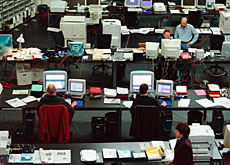
Switzerland fails to tackle growing “digital gap”

The new information and communications technologies (ICTs) have penetrated every sector of Swiss society.
However, much of the population is still excluded, despite the strategy launched by the government to reduce the digital divide.
In Switzerland, ICTs have become established practically by default, finding fertile soil in which to grow: advanced technical infrastructure, a favourable market and a high standard of living.
“We can fairly claim that Switzerland is one of the world leaders where ICT facilities are concerned,” said Florent Cosandey, a scientific co-worker at the Swiss Federal Statistics Office.
Computers and internet facilities are now a familiar feature in almost all companies and schools, and in more than 60 per cent of households. Meanwhile, 80 per cent of the population use a mobile phone.
ICT strategy
In the past few years, ICTs have assumed such social and economic importance that the state could not remain on the sidelines.
In 1998 the Swiss government introduced its first strategy for an information society, setting out principles for promoting and regulating the spread of ICTs.
The strategy also included measures to combat emerging problems, not least the growing “digital gap”.
Even now, one third of Swiss people have never handled a computer. And at least half have no experience of the internet, or use it only to a limited extent.
These sections of the population contain disproportionate numbers of women, elderly people and, more generally, people with a low level of educational attainment or on low incomes.
The “digital gap” not only reflects existing social inequalities; it could lead to a dramatic increase in these disparities.
Lack of adult training
Though regarded as one of the main objectives of the government’s strategy, in recent years the training of adults in ICT skills has been almost totally left to the cantons and private sector.
“Priority has been given to training young people. This is undoubtedly useful in the long term, but meanwhile adults are being left behind,” said Sabine Brenner, author of the fifth report on the information society drawn up by the Federal Communications Office.
Many adults, who were already finding it hard to assimilate information, are now having great difficulty in handling the tools used for sending and receiving it.
“People who have not mastered ICTs are not only at a disadvantage in the labour market, but are in danger of finding themselves completely excluded: many job advertisements are now published exclusively on the internet,” explained Cosandey.
Funding cuts
The programmes launched by the government have recently been affected by drastic cutbacks.
Even training programmes for young people have suffered badly: the sum allocated for promoting internet facilities in schools over a five-year period has been reduced from SFr100 million to SFr35 million.
“Now the period of euphoria about the internet and ‘dot-coms’ has come to an end, we are seeing a decline in interest in many important implications of the information society,” noted Brenner.
“For example, in the past couple of years parliamentary initiatives in respect of ICTs have been concerned almost exclusively with issues of security.”
New legal framework
And, of course, security was one of the strategic objectives laid down in 1998. A committee of experts was appointed to propose more effective legal measures to combat cyber crime: the publication of unlawful material, the dissemination of viruses, violations of intellectual property rights and so on.
And efforts are still being made to settle various cases regarding criminal liability for unlawful material published on the web, to bring Swiss legislation into line with that of other countries, and to divide up responsibilities between the federal government and cantons.
A new legal framework has been introduced to regulate certain branches of the ICT field, such as the mobile telephone sector. The liberalization of the telecommunications sector is now almost completed.
Excessively high prices
Compared with other countries, Switzerland is characterized by very high per-capita spending on information technologies (approximately SFr4,000 per head per annum).
The bulk of this money is spent not on equipment (hardware, software and programmes), but on services: the costs of telephone calls, internet services, cable television charges and the radio and television licence fee are still among the highest in the world.
And the services sector has also been where most of the development in ICTs has occurred. Switzerland – the country that gave us the internet (CERN) and the mouse (Logitech) – has failed to become a front-ranking producer of ICT equipment.
swissinfo, Armando Mombelli
Statistics for telecommunications in Switzerland (2003):
71 computers for every 100 inhabitants.
79 mobile telephone subscribers for every 100 inhabitants.
48 regular internet users for every 100 inhabitants.
In 1998, the Swiss government introduced its strategy for the new information society.
Its priorities included the promotion of ICTs, the definition of a legal framework to combat cyber crime, and measures to reduce the “digital gap” opened up by the new electronic media.
The programmes have been delayed or scaled down as a result of cuts in federal government spending.
The Swiss are among the major consumers of ICT equipment and services.
Switzerland’s share of the industrial production of ICT equipment has remained fairly modest compared with other European countries.

In compliance with the JTI standards
More: SWI swissinfo.ch certified by the Journalism Trust Initiative





























You can find an overview of ongoing debates with our journalists here . Please join us!
If you want to start a conversation about a topic raised in this article or want to report factual errors, email us at english@swissinfo.ch.